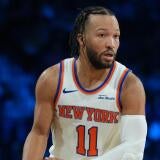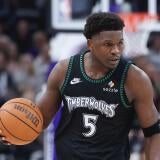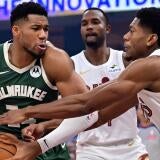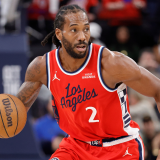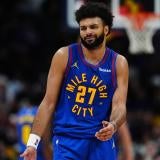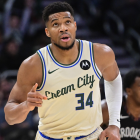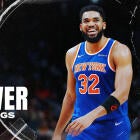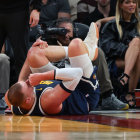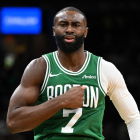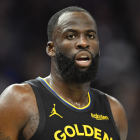Q&A: Metta World Peace on wanting to sign with Pacers or Pistons in 2009, growling monkeys in Panama jungle
In advance of 'Beyond the Edge,' the all-time stopper talked to CBS Sports about his playing days, his coaching career and more
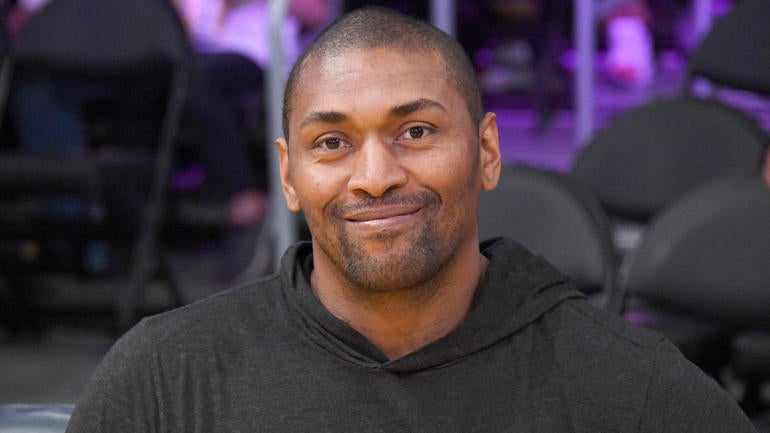
Of all the words that Metta World Peace, aka Metta Sandiford-Artest, aka Ron Artest could use to describe himself, "wuss" is among the most improbable. Every time the pride of Queensbridge does a reality TV series, though, there are moments where he wonders if he has signed up for more than he can handle.
"I'm always like that on these shows," he said. "I've done a lot of these TV shows, and when it's like pranks or whether it's 'Big Brother' or 'Beyond the Edge,' I'm always kind of a wuss. Sort of."
The Panamanian jungle is not an easy place to live, no matter how brave you are. World Peace said he was convinced to go there for "Beyond the Edge," though, after "people close to me and then also the network and the producers" convinced him that it would be not just tough -- it is being marketed as the most extreme celebrity adventure show ever -- but fun. In retrospect, "it was well worth it, but really tough," he said. (CBS Sports is referring to him as Metta World Peace at his manager's request, as he went by that name on "Beyond the Edge," which premieres on Wednesday, March 16 on CBS and Paramount+.)
On the court, "when I was pressuring people, the main thing was I just wanted to outwork my opponent," World Peace said. "A lot of my opponents were faster than me. But they didn't have more endurance." In a wide-ranging interview, he looked back on his 18 years as a professional basketball player -- including his hopes of signing with the Indiana Pacers or Detroit Pistons five years after the Malice at the Palace -- and discussed his coaching career and his latest endurance test, which featured poisonous spiders and growling monkeys.
The following Q&A has been lightly edited for clarity and flow.
CBS Sports: You're known first and foremost as a defender, but you were All-NBA when you won Defensive Player of the Year and you were averaging 25 points when you got suspended. At that point in your career, where was your offensive game and your level of confidence in it?
Metta World Peace: There was nobody that could guard me. There was nothing anyone was doing [to stop me]. I was locking people up and then I was also putting up numbers. And I was about 248, 250 [pounds] at that point. Really in great shape. And the brawl came, I was about 273 when I got to Sacramento from the trade. I was kind of heavy. I kind of almost gave up on basketball. But right before that point, I mean, we had everybody in the league at that point -- [Tim] Duncan and Kobe [Bryant] to Shaquille [O'Neal] to so many amazing players -- and to make third team All-NBA in that era and then the next year be better, that shows what type of player I was in that era.
CBS: How close were you to playing in Greece in 2004 and 2009?
MWP: Greece was really close, especially in 2009. Because at that point I wanted to play on certain teams, but [couldn't sign with] the teams that I wanted to play on when I was in free agency. Indiana was one of the teams I wanted to play for. And then I couldn't play for Indiana. And I wanted to go back to the Rockets, but the Rockets did whatever they did. And then I tried to go to Detroit, but those discussions kind of was shot down. That was shot down.
I didn't want to team up with anybody. I wanted to go to one of those teams and then play against the best players in the league. So at that point I told my agent, who was David Bauman at the time, to look into Greece. And they thought I was playing around 'cause they couldn't pay as much as the NBA or whatever. But I never really played for money anyway, honestly -- when I was playing, that was the last thing on my mind. But they just didn't take me serious, so I was like, "Whatever." The Lakers called me, and I was surprised to hear from the Lakers. But they called and I met with Dr. [Jerry] Buss that morning and the rest was history.
CBS: Which team would you have joined in Greece?
MWP: I can't remember what team. I just always wanted to play in Europe. I wanted to play in my prime, I didn't want to be out of my prime in Europe. I always wanted to play in Europe, so that was the main reason. But I knew Greece was somewhere where I wanted to play, and I visited Greece and I like Greece.
CBS: And you looked into going back to Indiana or signing with Detroit?
MWP: Indiana, I wanted to win a title. I wanted to win a title no matter where I go, but Indiana was a place I wanted to win a title. And then since I couldn't get to Indiana, the next best place was Detroit. I thought winning a title in Detroit, you know, "Ron Artest" on the back of a jersey in Detroit, I thought that was like really hard. I thought that was just like, you know, that just would've been the hardest thing to see. I just thought that was dope, honestly. I was trying to make it happen, but it didn't happen.
CBS: What happened when you were thinking about giving up on basketball in Sacramento?
MWP: I didn't really want to play at that point. But [coach] Rick Adelman's amazing. I told Rick Adelman, "Listen, if we could somehow sit me on the bench, I'll be very positive. I don't want to make a big thing out of this, but I just don't feel like playing." And then Rick Adelman told me, "We're going to go as far as you take us." We spoke a little bit about it and I was like, "OK." And it was great, man. He kind of helped, he kind of got me back loving the game. And the way he coached was just incredible, man. He's such an incredible coach. I learned so much, and I apply a lot of what I learned from him to my coaching today.
CBS: What did you learn from him?
MWP: I think his spacing, teamwork, ball movement, trusting your teammates, finding the open guys, smart basketball, [player] movement. His offense -- the corner triangle with the high post -- it just opened up so much and so many opportunities. And you look at how Vlade Divac played, [Chris] Webber, you look at those great teams, those guys were a force. And all that's Rick Adelman.
CBS: You were on Coby Karl's staff with the South Bay Lakers -- what was life as a G League assistant coach like? What do you like best about coaching?
MWP: It was great, it's fun just teaching, you know? I had a chance to coach [Alex] Caruso, coach under Coby Karl. It was a really cool experience. And I'm looking forward to carrying it over to one day when I become a head coach.
I just like being able to get into practice, work on defense, push the pace: fast, fast pace, Jamison Brewer-style. Jamison Brewer was ahead of his time in 2004. They just caught up to Jamison in 2015 or whatever the case may be. He was way ahead of his time. And he was a pick-you-up-full-court guy and he'd push it back at you going the other way and just score, score, score, score, score, quick. And that's what I like, defense and offense.
CBS: When you took a job at Circuit City as a rookie, it was seen as kind of a goofy stunt. At the time, what went into that decision?
MWP: I think when I was working at Circuit City when I was playing in the NBA, the main thing was that I just wanted a job. I was always interested in working. And my friends were working there. And I was kind of bored also. And I didn't want to get into trouble. Just too many things came into play where I said, "You know what, I'll just apply for a job at Circuit City." I enjoy being at Circuit City, you know what I'm saying? I enjoy walking around and looking at technology and entertainment stuff, so I was like, "You know what, I'm here every day anyway, I might as well get a job here." And it was that simple.
CBS: Your documentary "Quiet Storm: The Ron Artest Story" came out a couple of years ago. What's it like to see your younger self on screen?
MWP: It's kind of a little bit disappointing because the career could have been -- right now the career could have had a lot more stats. I love everything: I love winning and I love stats. I love winning, I love stats and, the way I play, I was never going to get a ton of points but I could've got more than what I got now. I think I got 13,000 or something like that. (World Peace scored 13,058 total points in his career.) And you count the missed year and all the suspensions, I mean, you're talking about like 15-18,000 points for me, you know? Which would've been great. Probably 20,000 if I stayed at Indiana.
So when I look at it like that, that's why I'm always real sensitive when I see guys not playing or if I see guys not really handling a situation. I'm always thinking that players should handle it differently, take care of yourself, get back on the floor, so when your career is over, you can pile up all the stats, you can hang it up on your wall, you can talk about it. You don't want to miss out on an All-Star team. You don't want to miss out on an All-NBA team. You don't want to miss out on -- I got a Citizenship Award, I'm really happy about that one. I got pretty much every award except for MVP and First Team All-NBA. But I got all the other awards, so that's pretty cool.
CBS: It's interesting that you bring that up because I've heard you say that you wanted Ben Simmons to play for the Sixers, but it didn't sound like you were judging him for sitting out, either.
MWP: That's 100 percent correct. Because I would love to see these guys play and figure out a way to get them on the floor because I just think that, when your stats add up at the end of your career, it's just going to make you really happy. You're going to be really happy when you're at the end of your career and you got everything out of it. Like Carmelo Anthony, LeBron James, these guys are getting everything out of it. And a guy like Ben, I would like to see him get as much as he can from the game [in terms of] winning and personal stats also.
CBS: He stood up in front of his teammates and told them he's not mentally ready to play. What's your perspective on that?
MWP: I understand that. Because I was going to retire at 23. I actually received my retirement papers. So I get it, for sure. But I can also give my perspective on it because I finished my career, I played 18 professional years. And I also understand sometimes you need that space. You're only a human being. And people gotta be understanding of that because even the best CEOs or even the best workers, sometimes you need that vacation. And you take your vacation time early, you might take it late. I just think professional players are no different, but it's not that easy to just take a vacation when you're playing.
So you can get through it. But sometimes even the summertime is not enough time to deal with it. People think, "Oh, you had all summer to deal with it." But it just doesn't work like that for everyone. So I can see why Ben didn't play.
Thanks @CBS . This was the most competitive experience I’ve ever been part of. Never in my life have I had a rush like this . My sugar water as a kid , and smelling my babies diaper , but nothing like this . Thanks a ton https://t.co/CI9xrgE1XE
— Metta.nft (@MettaWorld37) February 3, 2022
CBS: To follow up on your tweet about "Beyond the Edge," can you tell me about the competitive rush you felt on the show?
MWP: Yeah, it was the only time I felt that Game 7 type of feel other than [Game 7 of the Finals]. And you'll see what I'm talking about. But "Beyond the Edge" is just so competitive. Everybody's on an even playing field and different things like that. And it's also, you know, you're playing to win. Different teammates every day. It's physically exhausting. And living at night in the jungle is not easy also.
CBS: What was the worst part of living in the jungle in Panama?
MWP: The worst part was a nighttime. You just never knew if it was going to rain or not. It was dark. It's not a tent, it's more of a hut. All sides are open. And you just can't see. Pitch black. You can't see anything. So you're talking about a jungle where they removed 16 boa constrictors, they removed a couple of caimans. We were right next to a swamp, like maybe 50 feet from a swamp, so I'm sure they removed them. But it was poisonous spiders. The monkeys were not happy that we were there for that time. They were very, very upset.
These weren't chimpanzees, which are great. These were adult monkeys that -- their growl is maybe five times that of a pitbull. Very intimidating growl. So to hear them on the trees at night, sometimes they were far away but you can hear them. And sometimes they'll be a little too close. It depends on where you go. So it was wild.



